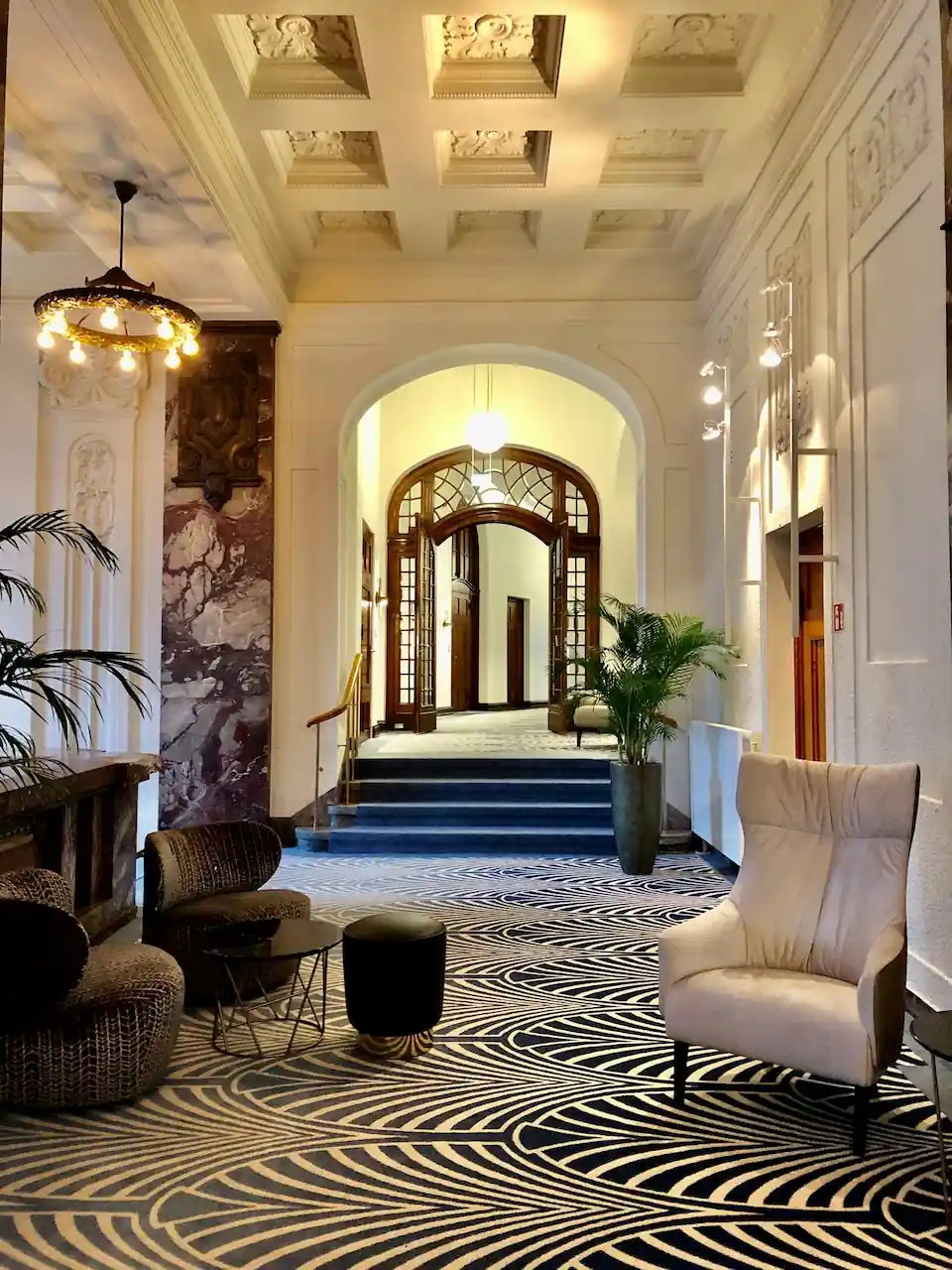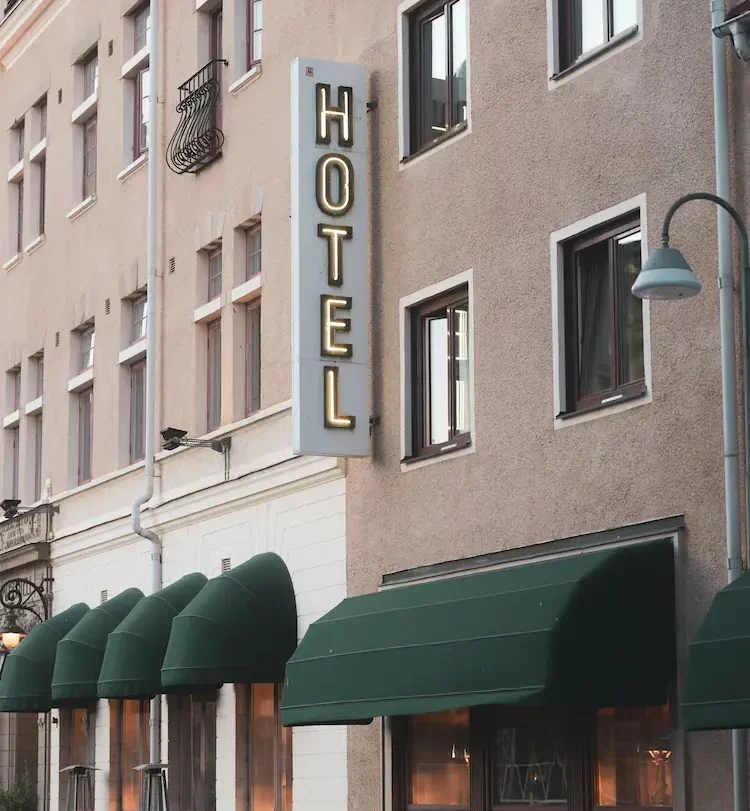Efficiency in hotels, the role of the PMS system behind the scenes
Leading hotels use Property Management Systems (PMS) to run their business with precision. A PMS manages everything from bookings and room allocation to billing and guest profiles. The system connects bookings, reception, cleaning and maintenance in one platform. This makes daily workflows smoother and improves guest satisfaction.
Understanding the key benefits of PMS systems
- Automating hotel operations for greater efficiency.
- Offering personalised guest experiences for higher satisfaction.
- Provides data for strategic decision-making and financial management.
1. improved efficiency
PMS systems automate tasks and free staff from repetitive tasks such as checking in and out. These systems often integrate with other platforms, such as point-of-sale (POS) systems and booking engines, creating a unified data flow. This integration reduces human error and minimises manual workload.
The seamless connectivity offered by PMS systems is crucial in an increasingly interconnected hotel system. It allows real-time access to important data, facilitating quick business decisions. But it's not just about technology integration - it's about transforming workflows. Eliminating communication barriers in non-integrated environments can lead to increased productivity and higher customer satisfaction. For a deeper understanding of the benefits of PMS in the hospitality industry, you can explore more insights and examples via modern sources of PMS.
2. improved guest experience
PMS systems enhance the guest experience by enabling personalised services based on detailed guest profiles. This personalisation ranges from room preferences to specific service requests. The system also simplifies communication between the guest and staff by enabling quick responses to enquiries. In addition to the operational benefits, this transparency and efficiency can lead to a marked increase in satisfaction.
PMS systems also play a crucial role in strengthening the relationship between guests and hotels. They help track and store valuable insights into guests' preferences, allowing staff to anticipate needs and improve service. Such improvements are not just luxuries - they are necessary components of modern guest engagement strategies. Read more about related technology and its impact on guest interactions here, trends in PMS automation.
3. Data-driven decision-making
The analytics systems in PMS offer hoteliers powerful tools for decision-making. The systems provide comprehensive insights into occupancy trends and revenue patterns. Using data analytics, hotels can accurately track guest preferences and stay history. These insights are crucial for making informed decisions around marketing, pricing and service development.
PMS systems also support strategic planning by providing data that can predict demand and revenue streams. They help hotels create data-driven strategies and optimise both operational and financial performance.
4. streamlined management of finances
Financial processes in hotels can often be difficult to manage without smooth systems in place. PMS systems automate and improve these processes - from invoicing and payments to generating detailed financial reports. This automation not only saves time but also ensures compliance with strict financial regulations.
These systems effectively monitor multiple revenue streams and provide a holistic view of a hotel's financial health. This makes it easier for hotels to identify trends, allocate resources efficiently and plan for future growth. Automation of financial management is a growing trend, and the market for these solutions is expected to expand significantly. Those interested in how PMS systems can further improve financial management can read comparative studies of leading PMS system for more insight.
In conclusion, PMS systems are essential to ensure both operational and financial stability in the hospitality industry. Every aspect of these systems reflects the changing needs of modern hotels and their stakeholders.
Guests today have higher expectations. Let us show you how we can take your business to the next level.
Before we delve into the benefits of PMS systems, it's worth noting that this is based on some fundamental principles of PMS. Read our comprehensive guide on PMS systems, understanding the PMS system
Why PMS systems are essential for modern hotels
- Centralises management and unifies operations.
- Adapting to digital and market changes.
- Integrates advanced technologies like AI and IoT.
1. centralised management
With centralised management, all hotel operations are controlled from a single platform. It streamlines workflows and ensures that important information is always up-to-date and available to all departments. Having everything in one place makes collaboration easier, reduces the risk of errors and increases efficiency. For multi-site hotels, this is particularly important, as it allows guests, staff and resources to be managed in different locations without having to switch between systems. This saves both time and money while creating a more consistent experience for guests.
Gathering guest data in a centralised system also makes it easier to follow up on guest preferences and past visits, allowing for more personalised services. In the hospitality industry, where customer experience is key, this can be a major competitive advantage. Some may find that implementing a centralised system requires a lot of work, but the benefits - such as more satisfied guests and more efficient operations - often outweigh this in the long run.
To learn more about this, you can explore specific cloud-based PMS solutions enabling centralised solutions.2. Adaptability to market trends
For hotels to be competitive, they need to be adaptable. With modern PMS systems, pricing can be adjusted in real time based on factors such as demand, local events and even the weather. Dynamic pricing tools help hotels to optimise their occupancy and maximise revenue, providing a major advantage in a rapidly changing market.
Mobile and online bookings are now a given. PMS systems act as a bridge between traditional booking channels and digital platforms. By integrating with mobile apps and websites, hotels can reach more guests and adapt to changing consumer behaviour. Guests expect easy and fast booking, and hotels that offer seamless digital solutions have a clear advantage.
New technologies, especially AI, are making PMS systems even more flexible. AI can analyse trends, predict demand and automate tasks that previously required manual work. Many industry experts believe that traditional PMS solutions that focus solely on room sales are on their way out. Instead, modern systems are adapting to both market changes and guest expectations, making hotel operations more dynamic and profitable.
3. integration with emerging technologies
Technologies such as AI and IoT are no longer a vision of the future - they are already part of the hotel industry. AI is used to predict guest preferences and automate administrative tasks, while IoT makes it possible to create smart hotels where guests can check in automatically, control room functions and personalise their stay. These solutions improve both day-to-day operations and the guest experience, which is crucial in a highly competitive industry.
While implementing such systems can require investment and technical expertise, the benefits often outweigh the challenges. For hotels that want to stay ahead of the curve and offer a more personalised experience, the move towards advanced PMS systems is a natural and necessary part of the future.
4. improved guest experience
The core of a hotel's success lies in its ability to create memorable guest experiences. PMS systems contribute significantly to this by customising services based on guest history and preferences. The systems store important guest data, allowing staff to tailor service to individual needs. This data-driven approach not only improves guest satisfaction but also encourages return visits and positive word-of-mouth marketing.
While some worry about data protection, modern PMS systems come with robust security measures to protect guest information. Through integration with customer relationship management (CRM) systems, hotels can maintain a personalised touch while protecting sensitive data.
5. Operational efficiency and cost reduction
PMS systems improve operational efficiency by automating repetitive and time-consuming tasks, allowing staff to focus on delivering better service. This automation covers everything from room bookings and inventory management to billing and guest management. The simplification of these processes reduces errors and operational costs.
Through integration with financial systems, PMS ensures that all financial transactions meet industry standards. This provides hotels with valuable insights into revenue streams and helps with budgeting and forecasting. Some critics say that the initial cost and complexity of implementation can be a challenge. But by utilising hidden features Beyond the basics, these barriers can be addressed and lead to long-term savings and efficiencies.
In conclusion, PMS systems are essential for modern hotels. They centralise operations, adapt to market trends and integrate new technologies. They transform guest experiences and improve efficiency.
8 tips for choosing the right PMS
Choose a cloud-based PMS for better scalability, remote access and automatic updates.
Ensure that the PMS has seamless integration with OTAs and direct booking engines to maximise occupancy.
Look for dynamic pricing tools that adjust prices based on demand, season and competitor prices. Often this is an integration to an external platform.
Choose a PMS with CRM features to track guest preferences and increase repeat bookings.
A mobile-friendly PMS allows staff to manage operations from anywhere, increasing efficiency.
Advanced reporting tools help you track revenue, occupancy trends and profitability in real time.
Secure and smooth payment processing speeds up transactions and reduces the risk of errors.
Automate task distribution and get real-time updates to improve turnaround times.
Addressing common challenges with PMS systems
- Adapting the right PMS to the needs of the hotel is crucial.
- Training and proper implementation are key to success.
- Regular updates ensure continuous improvements.
1. Choosing the right system
Choosing the right Property Management System (PMS) is crucial to a hotel's success. It's about ensuring that the system meets both current needs and future growth. First, you should evaluate how well the system's features align with the hotel's operations. Does the PMS support bookings, guest profiles and housekeeping? How does it handle reporting and analytics?
Scalability is equally important. A flexible system that can grow and integrate with other software, such as booking engines and CRM systems, offer a long-term solution. Third-party integrations are crucial to expand capacity without major restructuring. In addition, it is important to evaluate the supplier's support. Security features, such as data encryption and user authentication, should not be overlooked. Look for providers with strong customer support and a good reputation.
Read more in Exclusive insights: How successful brands choose PMS systems for a deeper understanding of key decision-making factors.
2. training and implementation
A well-chosen system is only effective if users can handle it in a professional manner. Training programmes and onboarding are crucial as they directly affect the customer experience. Successful implementation requires careful planning to minimise disruption during the transition phase.
It is important to work with suppliers to ensure a smooth transition. Supplier support can significantly reduce the learning curve for the new system. Clear and timely communication with hotel staff helps create understanding and increase engagement from employees who may otherwise be reluctant to change.
3. continuous system optimisation
Once the PMS is implemented, the work does not stop there. It is important to keep staff up to date with the latest features. Regular updates and training ensure improved efficiency and safety.
By actively collecting user feedback, the system's functionalities can be constantly improved. Regular team meetings are valuable to discuss any problems and brainstorm solutions. Implementing a feedback process helps to identify and address challenges before they become major obstacles.
4. Dealing with data security issues
In an age where data breaches often make the news, robust security measures are a necessity when using PMS systems. It's not just about having encryption and authentication protocols in place - staff must also understand their role in maintaining data security.
Train staff on security best practices and conduct regular audits to ensure compliance.
10 pitfalls to avoid when choosing PMS.
Ensure that the PMS integrates seamlessly with your existing systems (e.g. CRM, accounting, booking platforms).
Ensure that the PMS integrates seamlessly with your existing systems (e.g. CRM, accounting, booking platforms).
Ensure that the PMS integrates seamlessly with your existing systems (e.g. CRM, accounting, booking platforms).
Ensure that the PMS integrates seamlessly with your existing systems (e.g. CRM, accounting, booking platforms).
Ensure that the PMS integrates seamlessly with your existing systems (e.g. CRM, accounting, booking platforms).
Ensure that the PMS integrates seamlessly with your existing systems (e.g. CRM, accounting, booking platforms).
Ensure that the PMS integrates seamlessly with your existing systems (e.g. CRM, accounting, booking platforms).
Ensure that the PMS integrates seamlessly with your existing systems (e.g. CRM, accounting, booking platforms).
Ensure that the PMS integrates seamlessly with your existing systems (e.g. CRM, accounting, booking platforms).
Delays and crashes can negatively impact both the guest experience and daily operations.
How PMS systems affect the hotel industry at large
- PMS systems integrate with IoT and AI for better guest experiences.
- The industry's focus is on security, cloud-based solutions and collaboration.
- Understanding these changes will help hotels prepare for the future.
1. the link with other hotel technologies
PMS systems are no longer just about bookings and check-ins. They have become the hub of technological developments in the hospitality industry. By integrating with the Internet of Things (IoT), rooms can become smart and more personalised to the guest. This can include automatically adjusting the temperature, customising the lighting or even sending personalised greetings via voice assistants.
AI-driven technologies are also playing an increasing role. By analysing guest behaviour, hotels can offer more tailored experiences. PMS systems are also being used to monitor energy consumption and reduce waste, in line with sustainability goals and greener operations.
2. Industry best practices
To make the best use of PMS systems, hotels need to prioritise several key areas. Data security and guest privacy are crucial, especially as more and more information is collected. Regular security checks and training for staff are necessary to protect sensitive data.
Cloud-based PMS solutions are becoming increasingly common, as they provide a flexibility that legacy systems cannot match. Hotels can easily access the system from different locations, making it easier to manage operations in real time.
By understanding how PMS systems impact the entire hospitality industry, organisations can better prepare for future technological developments. These insights will not only lead to more efficient operations, but also to better guest experiences and enhanced competitiveness.
Conclusion
Hotels that use modern Property Management Systems (PMS) are running smoother and faster than ever. It shows in the numbers - staff spend less time on paperwork and more time taking care of guests. Everything is connected in one system, from check-ins, guest experience, payments to financial reports.
The PMS is the main pillar of the hotels' operation. The front desk gets direct access to guests' requests. Managers can make smart decisions based on real data instead of gut feelings. The finance department gets accurate figures automatically. In short, hotels can focus on what really matters: giving guests a better experience.
PMS systems will only get better, and evolve. More hotels will start using AI features. The key is to choose the right system and make sure staff are well trained. Once everything is in place, the PMS will become the backbone of a successful hotel.
For hotels still thinking about implementing a PMS or revising their current one - the time is now. The hotel industry is changing rapidly, and guests expect faster service and more personalised experiences. A good PMS helps deliver both. It's not just about keeping up - it's about creating long-term success for your hotel.







